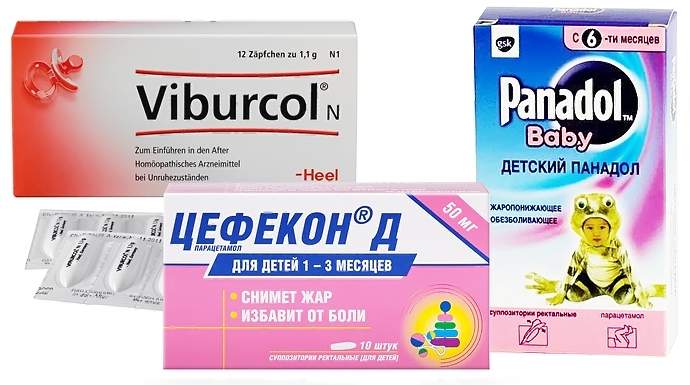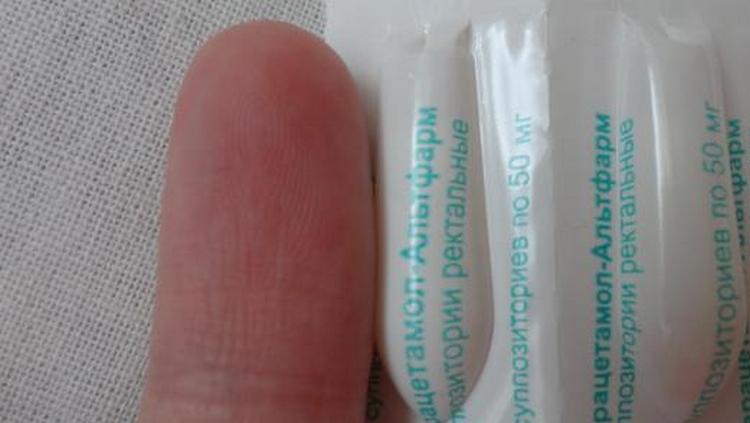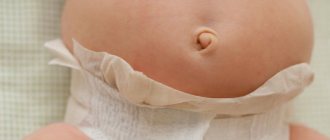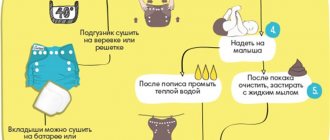What temperature should not be lowered and why?
When a baby has a fever, this is a sure signal that the body has begun to fight the infection and produces interferon, a protein that destroys the virus. And if you start knocking it down too early, you can prevent the immune system from fighting the pathogen on its own. In the future, you will have to resort to antipyretics all the time, since the immune system will “forget how” to do this on its own.
Only a very high temperature, 39-39.5°C and above, has a detrimental effect on the body; it should be lowered accordingly, starting from this point. At the same time, each little person reacts to heat in a unique way. Some look quite active and continue to play even at 39.5°C, while others feel extremely weak and lose consciousness already at 38°C.
Therefore, you should not focus only on the thermometer mark; you need to pay attention to the general condition of the baby:
- tearfulness;
- weakness;
- headache;
- difficulty breathing through the nose;
- chills.
Differences between different types of antipyretics
Many parents ask the question of what reduces a child’s body temperature faster and more effectively. In fact, there are no fundamental differences between candles and syrups. The liquid form of the medicine works a little faster, since the effect occurs over a larger area (the substances are absorbed faster). At the same time, you need to know that suppositories have a longer effect on the body and suppress fever and chills for several hours.
When is the best time to use candles:
- the patient is afraid to swallow the syrup, thinking that it is bitter;
- the baby is allergic to the components of the liquid medicine;
- it is necessary to maintain a normal temperature longer (preparing for night sleep).
Suppositories should not be used in case of stool problems (diarrhea) or other digestive disorders.
Pros and cons of using suppositories
If the baby has a high fever, pediatricians recommend giving syrup based on paracetamol or ibuprofen, since in this form the medicine acts as quickly as possible, within a quarter of an hour.
Rectal suppositories show their effectiveness after 35-40 minutes. But there are cases when their use for children is considered optimal, for example, if the baby falls asleep, or the gag reflex prevents the medicine from entering the body.
| pros | Minuses |
|
|
When is the best time to use syrup?
The use of oral antipyretics is justified when a complex effect on the body is necessary. Such drugs not only reduce the child’s body temperature, but also have an anti-inflammatory and anesthetic effect (which is very important when teething or treating infectious, viral damage to the respiratory system).
Popular syrups for children:
- "Ibuprofen";
- "Nurofen";
- "Efferalgan";
- "Panadol";
- "Calpol."
When choosing liquid medicine, be sure to read the instructions carefully. There are restrictions on the patient’s age and contraindications due to the presence of concomitant diseases (for example, diabetes). In case of individual intolerance, the antipyretic components can cause a rash, nausea, diarrhea, and disturbances in the bowel movement.
How can I summarize what has been written... Rectal suppositories are more often used to reduce fever in infants (up to 3 years) and have a longer effect on the body. Syrups quickly eliminate the symptoms of the inflammatory process, but can cause an allergic reaction.
List of effective antipyretic suppositories
| Name | Active substance | Adverse reactions | Contraindications | price, rub. |
| EFFERALGAN, from 1 month | paracetamol |
|
| 120,00 |
| PANADOL, from 2 months | paracetamol |
|
| 70,00 |
| CEFEKON D, from 3 months | paracetamol |
|
| 150,00 |
| VIBURCOL, from birth | herbal mixture (homeopathic remedy) | In very rare cases, allergic reactions are possible, including skin rashes and itching. | Hypersensitivity to the components, to chamomile or to other plants of the Asteraceae family. | 400,00 |
| NUROFEN, from 3 months | ibuprofen |
|
| 120,00 |
It is necessary to understand that adverse reactions occur in very rare cases. Before taking a medication, you should consult a pediatrician who will select the optimal dose and duration of treatment.

EFFERALGAN should not be given together with other products containing paracetamol . The maximum permissible daily dose for different weight categories in children is as follows:
- less than 37 kg – 80 mg/kg;
- from 38 kg to 50 kg – 3 g/kg;
- more than 50 kg – 4 g/kg.
It is important to remember that if hyperthermia lasts 3 days of treatment or more, or your health condition worsens, you should consult a doctor.
The maximum duration of treatment with PANADOL is 3 days. The drug may affect test results for uric acid and glucose levels in the blood. It is not advisable to give it to premature babies under 3 months, and not to give more than 2 doses to full-term babies under 3 months.
Frequency of application – 4 times a day with an interval of at least 4 hours. Single oral dose for children:
- up to 3 months – 10 mg/kg;
- from 3 months to 1 year – 60-120 mg/kg;
- 1-5 years – 120-250 mg/kg;
- 6-12 years – 250-500 mg/kg.
CEFECON D is often prescribed to children aged 1-3 months to reduce high body temperature after vaccination once. Suppositories cannot be distributed to obtain the required dosage. If, when calculating the daily dose in accordance with body weight, a single dosage is required that is less than the contents of one suppository, then after consultation with a doctor it is recommended to use other dosage forms of paracetamol.
In order to avoid overdose, it is necessary to take into account the following intake rates:
- 3-12 months (7-10 kg) – 1 suppository of 100 mg;
- 1-3 years (11-16 kg) – 1-2 suppositories of 100 mg;
- 3-10 years (17-30 kg) – 1 suppository of 250 mg;
- 10-12 years (31-35 kg) – 2 suppositories of 250 mg each.
VIBURCOL - a popular remedy for fever for children up to one year old, is a complex homeopathic drug that has a pronounced sedative, anti-inflammatory, analgesic, antispasmodic and anticonvulsant effect. The recommended dose for adults and children over 6 months in acute conditions is 1 suppository 3-5 times a day, if the condition has improved - 3 times a day.
The priority of VIBURCOL is that it can be used from birth, but it is better to obtain approval from a pediatrician before use. The duration of treatment and frequency of use is determined by a specialist depending on the nature and course of the disease. Usually the course of treatment is 3-14 days.
There are several important recommendations regarding treatment with NUROFEN, namely:
- It should not be used in combination with aspirin (acetylsalicylic acid), as this increases the risk of adverse reactions;
- If the baby has a fever, it is recommended to use it in combination with a paracetomol-containing drug (for example, NUROFEN - rectally, EFFERALGAN or PANADOL - orally). Thus, the antipyretic effect is achieved faster.
You can often hear from mothers that the best suppositories for children against fever are VIFERON. This opinion is considered erroneous, since the active ingredient of the drug is interferon.
Accordingly, the medicine is intended to destroy infections, but not with heat, and it also exhibits an immunomodulatory effect.
The TOP 10 antiviral drugs for children over 3 years old can be found here.
Instructions for use and dosage
Suppositories must be used rectally, that is, inserted into the child’s anus, placing the baby on his side or back.
- You must wash your hands thoroughly with soap or use medical gloves. The candle should be at room temperature.
- The suppository should be administered to the child with the pointed end after bowel movements.
- The baby's buttocks must be kept pressed for several minutes so that the child does not reflexively push the suppository back.

The single dose depends on the age and weight of the child. The optimal single dose is 10-15 mg per 1 kg of child weight.
- babies from birth to three months are allowed to use the drug only as prescribed by a doctor;
- for children from three months to a year (weighing from 4 to 10 kg) a single dose of one suppository of 0.08 g is recommended;
- for children from one to six years old (weighing from 10 to 20 kg) a single dose of one suppository of 0.17 g is recommended;
- For children from 7 to 12 years old, a single dose of one suppository of 0.33 g is recommended;
- For children over 12 years of age, a single dose of 1-2 suppositories of 0.33 g is recommended.
Important! Repeated administration of the suppository should be no earlier than after 4-6 hours, and no more than 4-5 times a day. In any case, it is necessary to focus, first of all, on the WEIGHT of the child. The daily dose of paracetamol should not exceed 60 mg/kg! Maximum permitted duration of use:
- children under 6 years old – 3 days;
- children over 6 years old – 5 days.
Precautionary measures
Precautionary measures when using antipyretic suppositories are quite simple, but they should not be neglected.
- Study the instructions for the medicine before using it.
- Store suppositories in the refrigerator, so the shape and consistency will not be affected.
- Strictly follow the dosage prescribed by your doctor.
- Do not take for more than 3-5 days (depending on specialist recommendations).
- Paracetamol-based products should not be combined with medications with the same active ingredient.
- It is better to replace antipyretic suppositories for children over 3 years old with syrup or tablets.
- Introduce fever suppositories for children according to the rules to prevent injury.
Terms of use
- It is better to put a candle after defecation, otherwise it may provoke the urge to defecate.
- Before starting the procedure, you need to wash your baby.
- If the baby says that he immediately wants to go to the toilet, you should ask him to be patient, as a false urge has arisen.
- If there is an inflammatory process in the rectum, use is prohibited.
- It is recommended to store the drug in the refrigerator and administer it chilled. If you hold the suppository in your hand for a long time, it will become deformed from the heat.
- If the baby resists and squeezes the anus muscles tightly, do not rush, as this can cause injury to the delicate mucous membrane.
If the baby still went to the toilet after using the candle, do not rush to put a new one . Some of the medicine may have had time to be absorbed into the blood. Set the thermometer in half an hour. If you see that the dynamics are declining, a new dose will not be required.
What are fever candles for children?
Most antipyretic suppositories, including children's suppositories, contain paracetamol. This is probably one of the most harmless drugs, often used in children. Paracetamol has an antipyretic effect, and the excipient - vitepsol - is a fatty base due to which the candle melts.
The dosage of paracetamol in suppositories is higher than in oral form and is 20 mg/kg (recommendations by O.E. Komarovsky).
Rectal suppositories can only be placed in the rectum, other methods of use are excluded!
Cons of candles:
- are absorbed for a long time, begin their action 40 minutes after administration;
- The duration of the antipyretic effect is short - up to 4 hours;
- can cause involuntary loose stools, hence the low effectiveness of the drug;
- Older children have difficulty placing candles.
There is even more information on how to reduce a child’s temperature using pharmaceuticals and physical cooling methods in the article by a pediatrician.
How to persuade your baby if he resists
This question does not arise if the baby is less than 1 year old. But how to put suppositories for fever for children over 1 year old, when the baby already understands everything and categorically refuses the indicated method of introducing the medicine into the body?
- Mom and dad need to show pedagogical skills; sometimes you can persuade, explain the importance of treatment, bribe with gifts, distract with cartoons, etc. Parents know the character of their children better and must choose the most effective method.
- The main thing is to come to an agreement with the child in order to avoid muscle tension..
- It is worth inviting the child to do this on his own, as fear arises from the inability to control the process.
- If you still can’t persuade him, and the baby is almost hysterical, under no circumstances should he be forced to do so. It is worth using drugs in a different release form.
conclusions
Which suppositories for fever are best for children is an individual question; they should be selected based on the recommendations of a pediatrician you trust, as well as from practice. An undeniable advantage of treatment with this particular form of the drug is that it is convenient to use for infants, as well as at night at a temperature of about 38°C . This is exactly what Dr. Komarovsky emphasizes in his interview. We advise all parents to watch it; among other things, it tells what conditions should be created in the room of a sick child (temperature, humidity).









